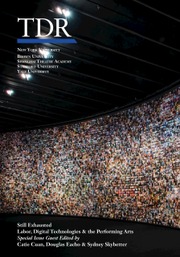No CrossRef data available.
Article contents
Under the Sign of The Mother
The Wooster Group’s Learning Play
Published online by Cambridge University Press: 10 March 2023
Abstract
A key lesson of the Wooster Group’s production of Bertolt Brecht’s learning play The Mother concerns the meaning of ownership in capitalism. Unlike other businesses that moved into SoHo during the wave of deindustrialization that began in the late 1960s, the group of actors that owns a former metal stamping factory at 33 Wooster Street shows that their relationship towards their means of production is not only economic, but also ethical. This is at the foundation of their distinct theatrical aesthetics.
- Type
- Critical Acts
- Information
- Copyright
- © The Author(s), 2023. Published by Cambridge University Press for Tisch School of the Arts/NYU




